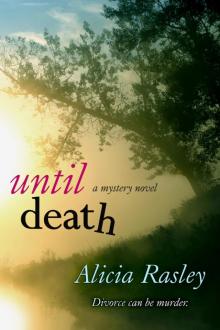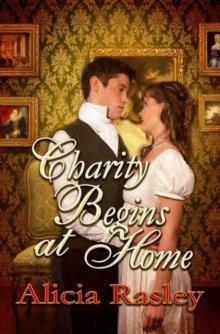- Home
- Alicia Rasley
Charity Begins at Home
Charity Begins at Home Read online
Charity Begins at Home
By Alicia Rasley
c. 1994 by Alicia Rasley
Published by Midsummer Books
Originally published as "A Midsummer's Delight"
Chapter One
May 1819
Aunt Grace said, "Charity, you didn't tell me this was an exhibition of pornography!"
Charity Calder turned guiltily from her admiration of a sinewy thigh emerging from a gold-braided tunic. Fortunately her aunt was too shocked by the painting to wonder at the true cause of Charity's flushed cheeks.
"Well you should blush, my dear. In the Royal Academy such doings! Don't they realize maidens will see?" Mrs. Garland tried to back away from the small study of a god and goddess on a sunswept beach, but the press of the crowd kept her almost nose to knee with Adonis.
"Oh, Aunt Grace, I have—had—five brothers." Charity hurried on past her mistake. "And none of them took the least notice of my maidenly sensibilities. I've seen more than this, I promise you." And less, she added silently, for her brothers all tended toward compactness and the Adonis standing ankle-deep in the Aegean was lean but well-built, if only, alas, of oil and canvas.
"And I expect you will tell me your brothers have seen more than that?" Mrs. Garland's arm swept accusingly past Adonis's bronzed body to indict his companion, whose charms were unconcealed even by a tunic.
"Not of me, I trust. Not that there's that much of me to see—generously endowed, isn't she?" Laughing, Charity gestured from Aphrodite's bared bosom to her own less majestic version, primly covered in rose and blue sprig muslin. "But Aunt Grace, Francis and Barry are both grown. It's not inconceivable that they've seen some other— Never mind, never mind. Don't you admire the golden beach? And the sea is so clear, why, you can even see her dainty toes! And do you not think the arrow Adonis is handing her most, oh, evocative?"
"Provocative, you mean! Charity, come away from there!"
"Oh, Aunt Grace." Charity was a lover of art and, she had recently decided, of the male form, though art was the only experience she had had of it apart from a few stolen embraces with neighborhood boys. And none of those embraces, she realized now, included a male form like Adonis's here. "That is Adonis with Aphrodite, who is playing the huntress for him. She has captured him, I think. Only he thinks he has captured her." Indeed, Adonis's dark eyes were blazing triumphantly at his captor and prey. "Do you see how they are both gripping the arrow?"
"I see nothing." Mrs. Garland was speaking only the truth, for she had pressed her palms to her eyes. "And you should see nothing either."
Bidding Adonis and his arrow a silent farewell, Charity took her aunt's arm and guided her to the next overheated gallery. This was Charity's third visit to Somerset House in a week, and the first time she'd managed to squeeze past the ground-floor galleries.
The Royal Academy of Art's annual exhibition was, as usual, a royal crush. This season the dandies and dragons were using its gilded chambers as a sophisticated Almack's Assembly Rooms for gossip and glamour and quizzing. But Charity couldn't complain, for the Academy's new wealth brought in a wealth of the art she, at least, really studied.
In this gallery every inch of wall, floor to ceiling, was covered by canvases in elaborate frames. One wall was devoted to landscapes, but as far as Charity could tell, that was the only method in the madness of the arrangement. Ward's ominous view of a derelict castle jostled a pretty scene by Crome of boys swimming in a country pond.
"You can open your eyes now, Aunt." Through judicious use of her cherry-handled parasol, Charity made room in front of a gentle portrayal of English farmlife. "Just a Constable. And a lovely one at that."
She left her aunt gazing determinedly at the cow lounging on a dewy hillside. Charity, a Kent girl, had seen enough cows to last a lifetime and, preferred more exotic vistas. So she slipped between a dandy and his acolyte and found herself mere inches from another landscape, this one vivid with the yellows and blues and reds of Italy. A village of whitewashed cottages rambled down a hillside to the sea. The terra cotta roofs were exuberant against the blue sky, and the sun spilled like melted butter on a turquoise sea. How shocking were the colors, and how right, and how very un-English.
The noisy crowd receded from her awareness. Charity laid her fingers lightly on the canvas, almost expecting to find it warm from the Italian sun. But it was cool and rough under her touch.
Then, at her shoulder, a gallery attendant appeared. "Please don't touch the paintings, miss."
The young man looked as if he expected her to pull out a knife, cut the canvas from its frame, and roll it into a tube to stuff in Aunt Grace's capacious handbag. She chuckled at the thought, and the attendant's scowl vanished to leave him looking young and confused.
"I am sorry." Charity hid the guilty hand behind her back. "Tell me, will you, what is the name of this painting? And the artist? I can't read the signature—isn't it odd that he paints the little whitecapped waves so precisely then scrawls his name incomprehensibly?"
The attendant nodded, then shook his head, then nodded again. Finally he ducked his head to study a catalog with handwritten notes in the margin. "It's Ferendisi, miss. That's an island village in the Adriatic. And the artist is the new Lord Braden."
The artist's title meant nothing to her, except as a village in Sussex, not far from her own Kent home. "He must be very accomplished to have been ennobled for his work," she murmured, gripping her parasol to keep her fingers from tracing the jagged line of the hillside.
"Oh, no, miss, I think he inherited the title. He's far too young to have earned such honors, though he's talented, they say. I prefer the Constables. This is too vibrant. Vibrating, almost." The attendant waited somberly for Charity's smiling response to his wordplay, then glanced down at his catalog. "He always paints the sea, I understand, even in the classical figures. The Aegean Aphrodite and Adonis in the antechamber is his also."
His gesture back toward the doorway collided with a dowager's turban and knocked it askew. As the lady sputtered and the attendant drew back in fear for his job and life, Charity stole a longing glance at the Italian village and then applied herself to setting things right. She murmured soothingly as she straightened the purple satin headdress, "No, no, the plume isn't broken at all; why, it looks quite jaunty, I'd say! Such a lovely color, almost like the heather in that Crome landscape over there. Have you seen it yet? Oh, you must, for I know you'll want to have a turban made of the exact shade of the sky" And she pointed the now-agreeable lady in the opposite direction and gave her a gentle shove.
Horrified by the use of the sainted Crome as a fashion device, the attendant started away. But Charity stopped him with an inquiring smile and a grip on his sleeve. He gazed down at her small, capable hand with its short nails and simple ruby ring, and cleared his throat. "Was there something else you wanted, miss?"
"Only a bit more information on this artist. Such dramatic use of color. Vibrant, as you said. I almost feel I am there in Italy. It's not often, is it, that a young artist gets two paintings in the Royal Academy exhibition?"
His lips twisted, and Charity suspected him to be a bit envious. She had heard about the favoritism of Academy members and wondered if their employee here would suggest the titled painter was a beneficiary.
But he only observed, "Thomas Lawrence had two paintings exhibited when he was but eighteen. Turner was made an associate at two-and-twenty." As he consulted his annotated catalog again, Charity wished she could steal this source of all artistic knowledge. "Braden was once a student here at the Academy school— as am I!— so the Academicians would be acquainted with his work."
"Do you paint yourself?" she inquired, turning back to that Italian summer day.<
br />
"I sculpt." His tone suggested that sculpting was by far the superior art.
All Charity knew of sculpture she learned while watching the butler carve the Christmas goose, but she asked brightly, "In what medium?" Surely this question must be as important to sculptors as to painters, for whom one's morals were somehow tied to one's medium.
"Clay, mostly. I want to try marble, but it's prohibitively expensive."
Struck by inspiration, Charity said, "You should come to Kent. We have miles and miles of chalk cliffs. I wonder what an accomplished sculptor could do with them. During the war I thought a massive sculpture of Admiral Nelson gazing over the Dover Harbor would discourage French invaders. Now where did you say this Ferendisi is?"
"On the Adriatic. Chalk? Is it very malleable? Would I use a chisel, or could I mold it by hand?"
Charity murmured suggestions then took herself back to Italy.
The attendant had long since moved away, still clutching the coveted catalog, when Charity felt an imperious grip on her elbow.
"Miss Calder! Your aunt said you were imprisoned here. She entrusted me with the message that she will await you in the lobby. And to judge by her expression, she prefers not to wait long!"
The beatific smile sat uncomfortably on Sir Ralph Bessemer's wolfish features. He was a rake of the first order, not the sort of man Aunt Grace would ordinarily entrust with a message or a maiden niece. But his father had recently died and left him in charge of ten thousand acres and three schoolgirl sisters. Ralph the Rakehell was in need of a wife, and Aunt Grace was happy to help out.
Reluctantly Charity took his arm, wishing she could be thrilled by the deliciously dissipated Sir Ralph. Not that he would ever be dissipated with Charity. She was, as he had told her approvingly at Almack's last week (word was he had to blackmail Sally Jersey to get a voucher to the hallowed hall), the best of good girls. And rakehells, unfortunately, wanted only one thing from good girls.
Mischief seized Charity as they passed the other contribution by Lord Braden. She smiled merrily at her escort. "Do you like that painting of Adonis and Aphrodite?"
"Certainly not." Sir Ralph quickened his pace, tugging her away from the immoral immortals. "Shocking the sort of things they put on public display. Why, the thought of an innocent girl like you exposed to such a sight!"
"But it's Adonis and Aphrodite who are exposed, not I.” Charity knew her slightly risqué wit was lost on Sir Ralph. He gave no sign of even hearing her little jest. For weeks he had simply ignored all evidence that Charity Calder was anything but a well-bred country miss, the perfect prospective wife. He had also ignored all evidence that Charity Calder had no desire to be his perfect prospective wife.
Sir Ralph's hand tightened on her elbow as they descended the opulent but steeply curved staircase. But he was only seeking to protect her from the sort of embarrassing tumble two ladies had already taken today. He released her with an abashed smile as soon as the danger was past. At the bottom Aunt Grace beamed up at them, no doubt imagining a more ceremonial descent down the steps of St. George's, Hanover Square.
Sir Ralph must also have envisioned such a scene. After he conveyed them across the Strand to their carriage, he pressed a chaste kiss on Charity's hand and gazed significantly into her eyes. "I should like to call on you this afternoon. Sir Francis has given me permission."
Traitor, Charity thought, for her elder brother had explicit instructions otherwise.
"Come for tea," Aunt Grace, another Judas, called back cheerily as she climbed into her seat.
"Ten thousand acres in Shropshire," Aunt Grace reminded Charity as the coach lurched down the busy Strand. "Four hundred acres of park— Capability Brown designed the grounds, my dear!— and a Jacobian manor. Why, it's in all the guidebooks!"
"I won't marry a house, Aunt. Or a park, Capability Brown or no. I don't love their owner. And he doesn't love me."
"He adores you! He gazes at you as if—"
"As if I were a prize broodmare. Or a particularly comfortable armchair." From her reticule, Charity withdrew her little everyday book and a lead pencil sheathed in leather. Dismissing Sir Ralph from her thoughts, she noted down, as neatly as the jolting of the carriage allowed, Lord Braden's name and a description of his paintings. She nibbled at the end of her pencil and then added a few other artists and paintings to the list. Later she would transfer this information to her journal, where she kept close track of her aesthetic education, haphazard and unsupervised as it had to be.
"But you've already turned down five offers! Five fine offers! A marquess! That nabob just back from Bengal!" Aunt Grace's lament was accompanied by such agonized headshaking that her gray fringecurls undid themselves in the humid May air. "And Charity, by rights you shouldn't have received more than one or two! You've no fortune to speak of, and the family is well-bred but nothing special, and—"
"And my looks are nothing special either!" Charity looked up from her book with a laugh. Early in the season she had encountered a girl who looked startlingly familiar, and she had wondered for a moment if they had been to school together. Then Charity counted up the nut brown curls, the spray of freckles across the snub nose, the frank brown eyes and realized, she looks just like me! She and Priscilla had shared a chuckle at the number of healthy English dairymaid sorts just like them in London this spring.
"Oh, you're fetching enough," Aunt Grace admitted, "but no Incomparable. I must say I never expected you to be so popular with the young men, for you're hardly in the first bloom of youth!" She reached across the divide and patted Charity's hand. "I know it wasn't your fault that your season was postponed so often, of course. But one can't arrange for familial deaths at convenient times. But you are rather old to be a deb, dear."
Actually Charity, who had nearly reached the age of one-and-twenty, had never felt younger. She had considered her youth ended years ago, when her mother died and left Charity the running of the household. Here in London, her responsibilities were so few she felt herself back in some lost and carefree stage of childhood. She had only to attend entertainments and remember names and receive morning callers—and afternoon proposals.
Perhaps she could find a way to beg off from tea. Aunt Grace's household accounts were in a tangle, after all. The butcher was demanding payment on three months of bills, while the housekeeper swore she'd paid him, so Charity could claim imminent litigation precluded her presence this afternoon.
Aunt Grace, reading her mind, moaned, "Charity, Charity, why don't you accept one of these nice young men? They all like you so well!"
"They don't like me. They don't even know me. They don't even know they don't know me." Sir Ralph's offhanded an innocent girl like you still rankled.
"Why, of course they know you, dear. Before Chilworth offered, he wrote a letter to your vicar inquiring about your character."
"He did? He did?" Charity suddenly wished she'd been less kind when she refused the arrogant marquess.
"He was only being prudent, my dear. His title, after all, is six centuries old, and he can surely be forgiven if he takes step to ensure that the mother of the next marquess is above reproach. As you are, of course. Chilworth's mama told me the Rev. Mr. Langworth was most laudatory and regretted only that marriage would take you away from the parish you have served so well." Mrs. Garland sighed in a most mournful way. "You are so very helpful, my dear. Everyone knows that, especially these men who are so enamoured of you."
Not of me, Charity countered silently. But it was no use to elaborate, for Mrs. Garland also thought she knew her niece through and through. Charity Calder, the cheerful, capable country girl, with the rosy cheeks and useful skills, was all too easy to know.
Not for the first time, Charity contemplated accepting an offer of marriage. Sir Ralph was rich and well-born, and his wife would certainly not lack for either material things or social status. He needed her, too, or someone just like her, to take charge of his sisters and servants and eventually his children. He p
erhaps even needed her to check that self-destructiveness that lurked on the dark side of every rakehell.
And to judge by his reputation, Bessemer was adept enough at the arts of love. Of course, that reputation was all Charity had to judge by. Last week at the Cranmere ball, she had been intrigued when the kingdom's premier rogue suggested a garden walk. She thought perhaps this man with the seductive silver eyes might be the suitor who would sweep away all her hesitation with his passion. But when she experimentally entwined her arms around his neck, he had responded with the merest peck on the cheek, the sort she might receive from the most respectable of suitors. Then, hastily, he suggested they return to the ballroom, for he didn't wish anyone to comment on their absence.
All in all. Sir Ralph had been a great disappointment.
But all in all, Sir Ralph was a gentleman, despite his thrilling reputation. So that afternoon, he did not argue with her rejection beyond a quarter-hour. Finally, in utter despair, he cried, "Then what am I to do with my sisters?"
This, at least, was a situation in which Charity could help. Eliciting the information that his obstreperous sisters were ten, eleven, and thirteen, she went to the cherrywood desk and neatly wrote out a few lines on her aunt's best notepaper. "They are just the right age for going away to school. I attended Miss Falesham's Academy in Maidenhead for two years and liked it very well. My mother became ill then, and I had to come home to take care of the household. But I've always looked back fondly on my schooldays. Miss Falesham is kind but very firm and adept at turning young girls into young ladies, even without their knowledge or consent!"
Grudgingly Sir Ralph accepted the name and address of this paragon, and even more grudgingly Charity's insistence that, no, she hadn't changed her mind in the last ten minutes. Only after he took his leave did Charity realize she should also have given him the name and direction of Priscilla Barrett, her lookalike from Lancashire. Charity just knew Priscilla, in the great tradition of understudies, could step right into the role of perfect wife. Sir Ralph would probably never notice the substitution.

 Until Death
Until Death Royal Renegade
Royal Renegade Poetic Justice, a Traditional Regency Romance (Regency Escapades)
Poetic Justice, a Traditional Regency Romance (Regency Escapades) Charity Begins at Home
Charity Begins at Home